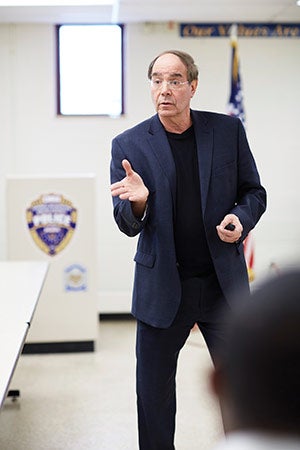launch
Turning Down the Heat
 PHOTO: KEVIN KOPANSKI
PHOTO: KEVIN KOPANSKIMark Singer said his up-close experiences with a variety of police officers leave him with great admiration. "There are exceptions in every profession," he said. "But if any citizen would walk in the shoes of a police officer for a week or two, they would realize the challenges, the emotional difficulties, the decisions that need to be made right on the spot."
In the frantic milliseconds of confrontations between police and civilians, calm and logic often can be in short supply.
Mark Singer trains officers to defuse tense situations. And with headlines blaring the body count of violent encounters from Ferguson, Mo., to Baltimore to Chicago to Cleveland, his work has never been more relevant.
Singer, PhD, the Leonard W. Mayo Professor in Family and Child Welfare at Case Western Reserve University's Jack, Joseph and Morton Mandel School of Applied Social Sciences, has trained police for more than 20 years.
And as deputy director of the Mandel School's Dr. Semi J. and Ruth W. Begun Center for Violence Prevention Research and Education and a psychiatry professor at the School of Medicine, Singer (SAS '79, GRS '83, social welfare) has the scholarly and street-level experience to help officers better understand mental illness, domestic violence and volatile adolescents.
"When you were teenagers, how many of you did something stupid?" Singer asked during a recent training session for new police officers of the Cuyahoga Metropolitan Housing Authority (CMHA). Several hands went up. "How many of you did something really stupid?" More hands.
"People's brains are not fully developed until their mid-20s," Singer explained. "It's the judgment part that is the last to develop."
Singer does more than classroom training. He often rides with CMHA Police Department officers for full shifts to experience the dynamics of crisis encounters and offer in-the-moment lessons for de-escalating tensions.
During one ride-along, CMHA officers responded to a threat of domestic violence. A man with severe mental illness was on the verge of assaulting his girlfriend. He also was carrying a paper bag that—as Singer suspected—contained alcohol.
"What would your psychiatrist say about you drinking while on medication?" asked Singer, knowing the combination of mental illness, medication and malt liquor could make him even more volatile. As they talked, the man relinquished the bottle. Singer recalled that one officer later said: "I wouldn't have thought to ask that question. Now I know."
CMHA Police Chief Andrés González said Singer is a "godsend" in helping officers change their approach to encounters.
"It's more humanistic and holistic," González said. "The officer is looking beyond what is going on in that moment and trying to understand the trauma of what [the other person is] experiencing. Before we even consider taking someone to jail—is there an alternative? What's the best thing for the individual?"
While perpetrators still must answer for their misdeeds, they perhaps need crisis intervention at a hospital or social-service agency first, González said. With the paradigm shift, officers "are experiencing a greater satisfaction with what they do."
Turning Advice into Action
Mark Singer has provided training for several police forces, including those at the City of Cleveland and Case Western Reserve.
During one campus session, Singer showed police a video of Swedish officers who happened to be on a New York City subway, calming violent passengers with moderated voices and courteous questions about them.
CWRU Cpl. Scott Del Rosa attended that training. Soon after, he was chasing a man— unconnected to the university—suspected of trying to spend counterfeit money on campus.
The man fell and Del Rosa put his new training in action. "I immediately said, 'Are you OK?' in a nice, calm voice."
Officers made the arrest without incident. Del Rosa later asked the man—whom he figured was about 6 feet 3 inches tall and weighed 220 pounds— why he didn't fight. "I didn't want to," Del Rosa recalled him saying. "You actually seemed like you were concerned."





